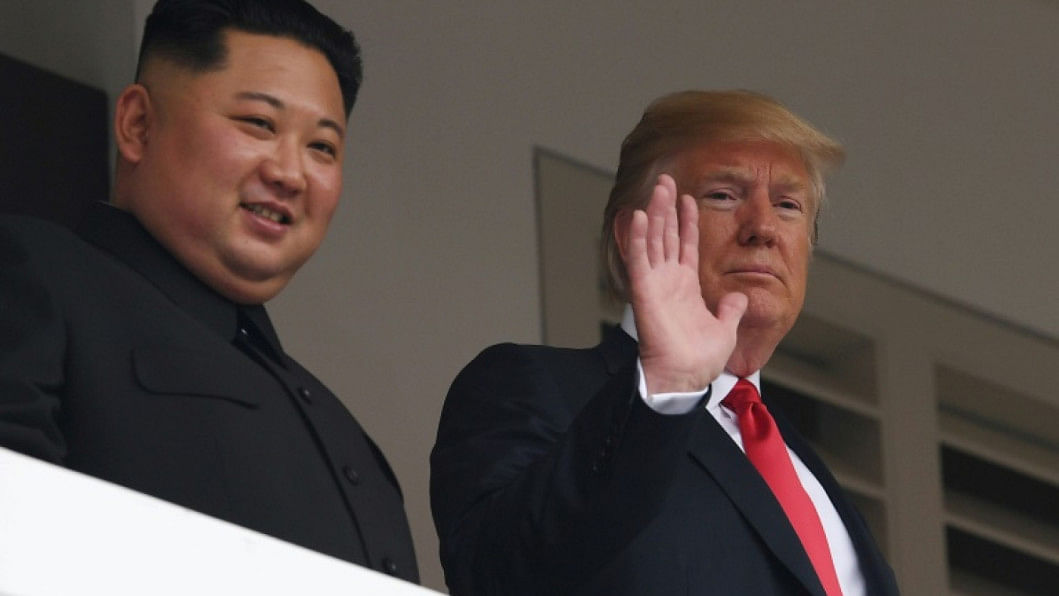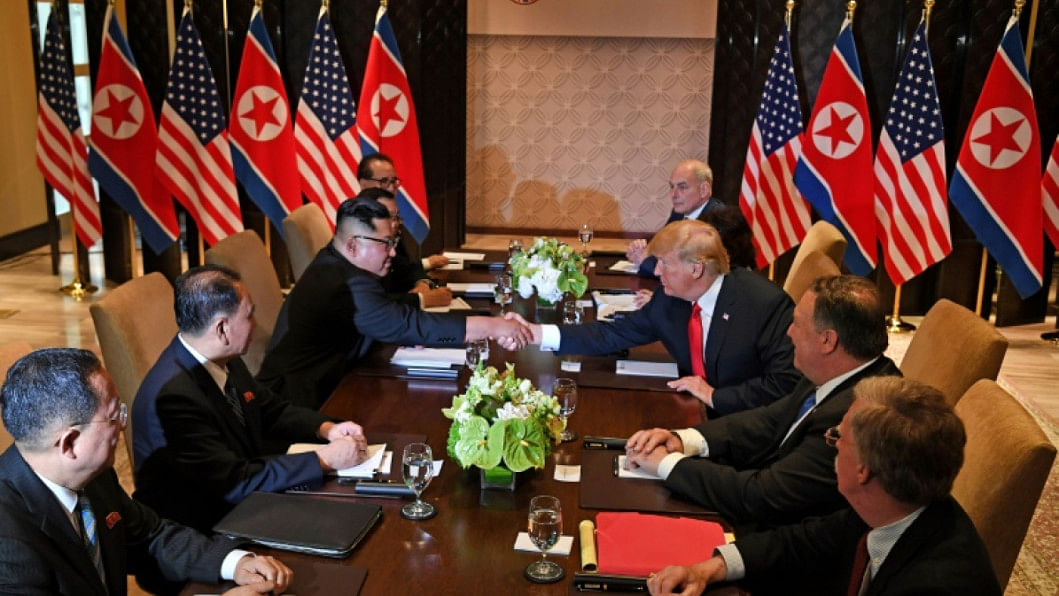Trump, Kim share historic handshake, warm words
The two men clasped hands beneath the white-washed walls of an upscale hotel in neutral Singapore, before sitting down for a half-day of meetings with major ramifications for the region and the world.

It is the first-ever meeting between sitting leaders of the two nuclear-armed foes and was unthinkable just months ago, when fears of war mounted amid missile tests and verbal insults.
The pair shook hands for several seconds, Trump reaching out to touch the North Korean leader on his right shoulder.
As they sat down for their one-on-one meeting, the US leader -- who had said he would know "within the first minute" if he a deal would be possible with his North Korean counterpart -- predicted a "terrific relationship" with Kim.
For his part, the North's leader made a reference to the two countries' history of war and acrimony, but noted the fact of their meeting showed they could overcome the past.
"The way to come to here was not easy," Kim said as he sat with Trump. "The old prejudices and practices worked as obstacles on our way forward but we overcame all of them and we are here today."
Trump responded: "That's true."
The imagery for the high-stakes meeting was undoubtedly positive and Kim Yong-hyun, professor at Dongguk University in Seoul said: "The atmosphere of the summit looks very good."
"It will be hard for this meeting to agree on specific deals but it carries considerable significance as a starting point," he said.
'Fire and fury'
The warm words seemed an age ago from when Trump was threatening to rain down "fire and fury" on Pyongyang and Kim attacked Trump as a "mentally deranged US dotard", as he fired off a series of provocative weapons tests.
Trump had cajoled the international community to exert "maximum pressure" to buckle Kim's regime if he did not give up his nuclear weapons.
The Singapore summit is a potentially legacy-defining meeting for both men -- comparable to president Richard Nixon's 1972 visit to China, or Ronald Reagan's summit 1986 with Mikhail Gorbachev in Reykjavik.

And it is part of what Trump calls a "one-time" offer to resolve the stand-off through diplomacy.
"We will all know soon whether or not a real deal, unlike those of the past, can happen!" Trump tweeted shortly before departing for the summit.
But many agreements have been made in the past with North Korea that have later fallen apart.
On the table is the vexed question of denuclearisation -- a euphemism that means vastly different things to the two parties.
It remains far from clear that Pyongyang is willing to give up its nukes -— weapons that the regime sees as its ultimate guarantee of survival.
And on the eve of the meeting, aides for both men were still scrambling to narrow yawning differences.
Secretary of State Mike Pompeo said Monday that the United States was willing to offer Pyongyang "unique" security guarantees if it denuclearises.
Hugely symbolic
The pair -- Kim in his thirties and consolidating his dictatorship, Trump in his seventies and struggling to bend Washington to his impetuous will -- are unlikely protagonists, both instantly recognisable, so much larger-than-life as to be cartoonish.
But their work Tuesday was deadly serious.
They represent nations that are still technically at war, even if the mortars, carbines and gunships of the bloody 1950s conflict have long since fallen silent.
The totalitarian regime has made rapid progress towards marrying nuclear and missile technology that would put Los Angeles, New York and Washington within striking distance of a nuclear holocaust.
The United States says that is unacceptable and will be dealt with, one way or another.
For North Korea the talks are hugely significant.
Standing beside the US president in front of a phalanx of cameras is an enormous step towards ending decades of international isolation and critics say it legitimises one of the world's most ruthless regimes.
Trump will use what he says are legendary instincts to see whether Kim if bluffing, buying time or is serious.
Kim and Trump met first in a closed session lasting around 40 minutes, before a larger meeting with key advisers.
But the summit itself is unlikely to be the end game -- more likely it is the start of a longer process of negotiation.
The discussions "will set the framework for the hard work that will follow", Pompeo said.

 For all latest news, follow The Daily Star's Google News channel.
For all latest news, follow The Daily Star's Google News channel. 



Comments